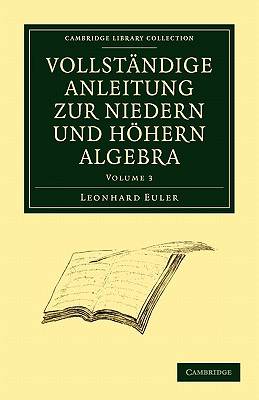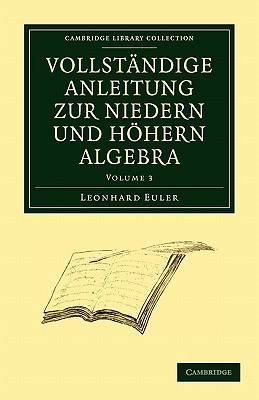
- Afhalen na 1 uur in een winkel met voorraad
- Gratis thuislevering in België vanaf € 30
- Ruim aanbod met 7 miljoen producten
- Afhalen na 1 uur in een winkel met voorraad
- Gratis thuislevering in België vanaf € 30
- Ruim aanbod met 7 miljoen producten
Zoeken
€ 37,95
+ 75 punten
Uitvoering
Omschrijving
In 1770, one of the founders of pure mathematics, the Swiss-born mathematician Leonard Euler (1707-1783), published an algebra textbook for students. It was soon translated into French, with notes and additions by Joseph-Louis Lagrange, another giant of eighteenth-century mathematics, and the French edition was used as the basis of this three-volume 1790s German edition. Volume 3 consists of the German translation of Lagrange's additional material, which the German publisher printed in a separate volume to enable those who already owned Euler's Algebra to obtain the supplementary material 'without incurring unnecessary expenditure'. The translator (the tutor to the sons of the Duke of Württemberg) added notes and further appendices of his own. This book provides tangible evidence of the lively international mathematical community that flourished despite the political uncertainties of the late eighteenth century.
Specificaties
Betrokkenen
- Auteur(s):
- Uitgeverij:
Inhoud
- Aantal bladzijden:
- 348
- Taal:
- Duits
- Reeks:
Eigenschappen
- Productcode (EAN):
- 9781108002110
- Verschijningsdatum:
- 20/07/2009
- Uitvoering:
- Paperback
- Formaat:
- Trade paperback (VS)
- Afmetingen:
- 140 mm x 216 mm
- Gewicht:
- 439 g

Alleen bij Standaard Boekhandel
+ 75 punten op je klantenkaart van Standaard Boekhandel
Beoordelingen
We publiceren alleen reviews die voldoen aan de voorwaarden voor reviews. Bekijk onze voorwaarden voor reviews.







